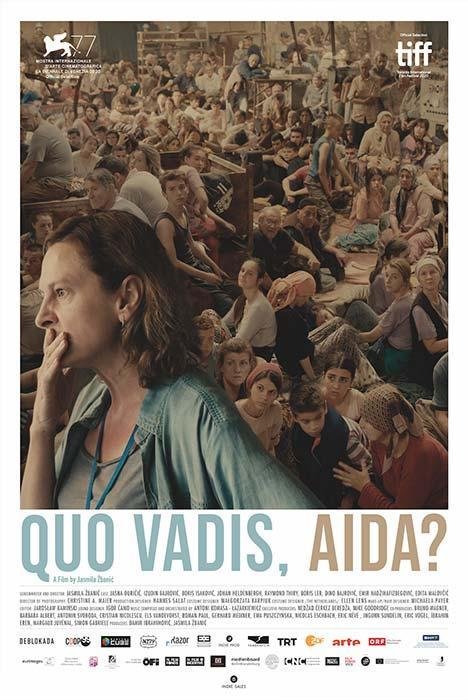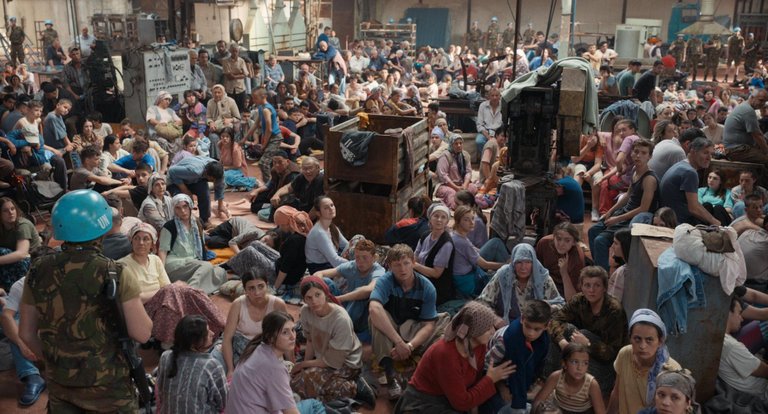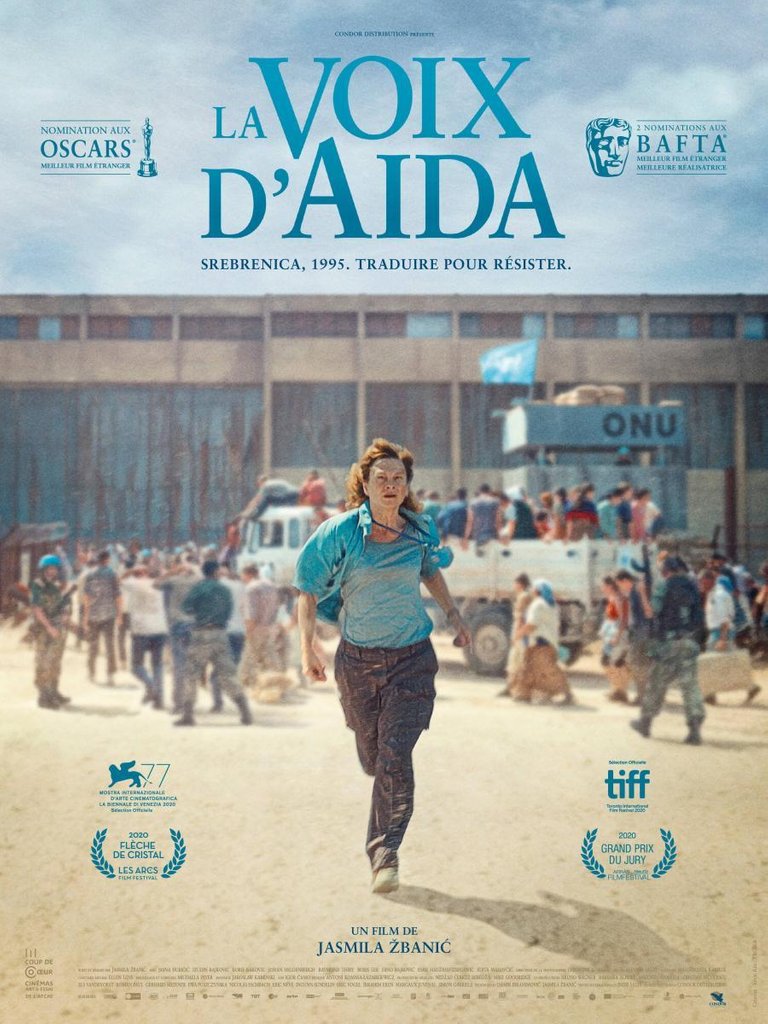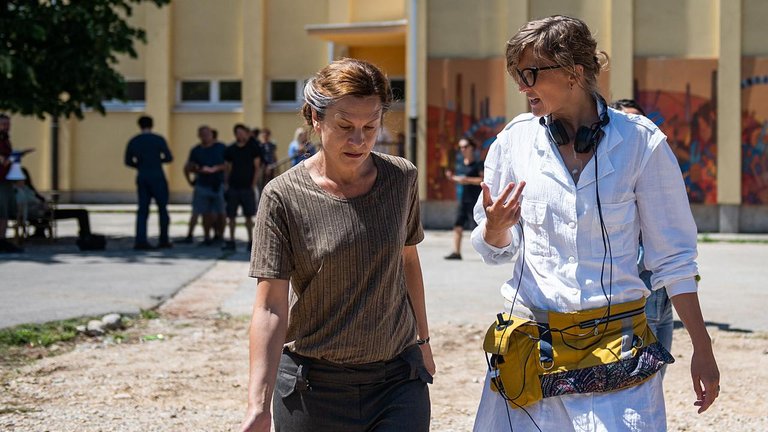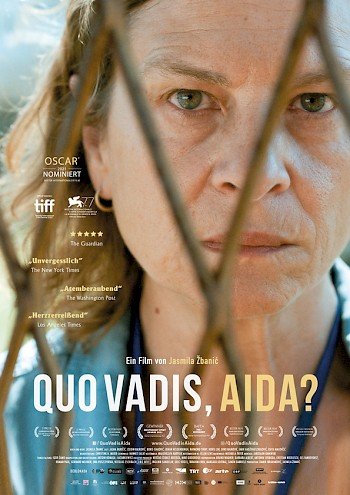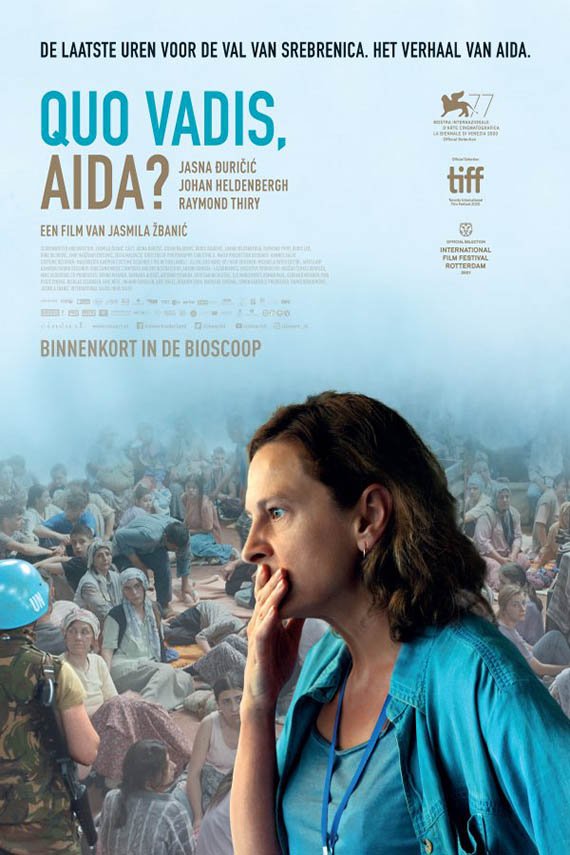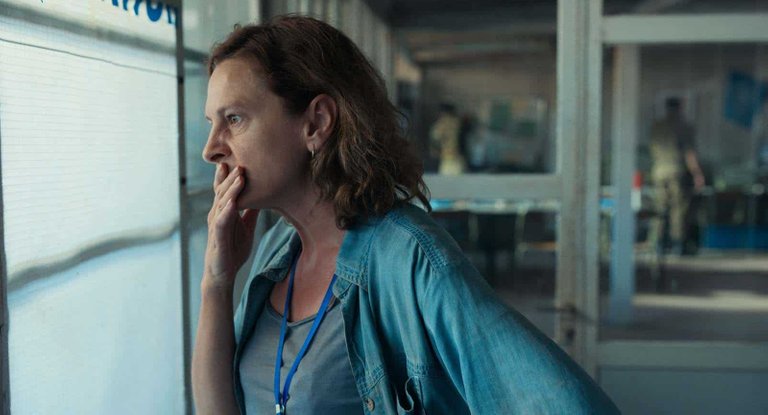
Una película Bosnia
This film was nominated for Best International Film in the last edition of the Academy Awards, a category in which it lost against Another Round, and since then I really wanted to see it. Finally, a few days ago, I was able to do it.
Esta película estuvo nominada a Mejor Película Internacional en la pasada edición de los Premios de la Academia, categoría en la que perdió contra Another Round, y desde entonces tenía muchísimas ganas de verla. Finalmente, hace algunos días, pude hacerlo.
Quo Vadis, Aida? is a film set in Bosnia, specifically in the month of July 1995. Aida, the main character, works as a translator for the United Nations in a small town called Srebrenica. Due to a complex combination of political and religious factors: nationalist exaltation, political, social and security crises that followed the end of the Cold War and the fall of communism in the former Yugoslavia, a series of warlike conflicts developed on the continent, within which the so-called Bosnian War stood out. It was within this framework that the Serbian Army occupied (invaded) the city of Srebrenica.
Quo Vadis, Aida? es una película ambientada en Bosnia, específicamente en el mes de julio de 1995. Aida, la protagonista, trabaja como traductora para la ONU en una pequeña ciudad llamada Srebrenica. Debido a una compleja combinación de factores políticos y religiosos: exaltación nacionalista, crisis políticas, sociales y de seguridad que siguieron al final de la Guerra Fría y la caída del comunismo en la antigua Yugoslavia, se desarrollaron una serie de conflictos bélicos en el continente, dentro de los cuales destacó la llamada Guerra de Bosnia. Fue dentro de este marco que el Ejército Serbio ocupó (invadió) la ciudad de Srebrenica.
An important fact is that that city was considered a Safe Zone under the UN protection, it was assumed that no army could shoot in that territory and that any intrusion or threat of attack would be considered an affront to the Organization.
Un dato importante es que esa ciudad era considerada una zona segura al amparo de la ONU, se suponía que ningún ejército podía disparar en ese territorio y que cualquier intrusión o amenaza de ataque sería considerada una afrenta a la Organización.
In the film they show how the UN dialogues with the Serbs and sends an ultimatum that they then do not comply with. It doesn't matter if it really happened like this or not, within the history of the film it is an important point because it shows the good guys, always respecting the norm, following the protocol, doing the right thing and how that is useless, even harmful, when they face the bad guys, unscrupulous people, without any respect for the rules and with a clear target. Added to this is the drama of a war with religious overtones because the Serbs who occupied Srebrenica were after the Bosnian Muslims (although later, when it was all over, it became evident that there were many victims who did not belong to this group).
En la película muestran cómo la ONU dialoga con los serbios y envía un ultimátum que luego no cumple. No importa si ocurrió realmente así o no, dentro de la historia de la película es un punto importante porque nos muestra al lado de los buenos, siempre respetando la norma, siguiendo el protocolo, haciendo lo correcto y cómo eso es inútil, incluso perjudicial, cuando se enfrentan a los malos, personas sin escrúpulos, sin ningún respeto por las reglas y con un objetivo claro. A ello se suma el drama de una guerra con tintes religiosos porque los serbios que ocuparon Srebrenica iban tras los bosnios musulmanes (aunque luego, cuando todo acabó, se evidenció que hubo muchas víctimas que no pertenecían a este grupo).
Within this general dramatic framework unfolds the particular story of Aida who, in her capacity as a translator for the United Nations and as a worker for the organization, does everything in her power to protect and save her family, her husband and two children are among the thousands of people seeking refuge in the UN camps. Written and directed by Jasmila Zbanic, the film maintains at all times the tension that is accentuated as the story progresses. Threats, bribes, manipulations, murders, physical, verbal and psychological torture, provoke in the viewer a great variety of emotions that keep him fixed to his seat.
Dentro de este marco dramático general se desarrolla la historia particular de Aida que, en su condición de traductora para la Organización de las Naciones Unidas y como trabajadora de la organización, hace todo lo que está a su alcance para proteger y salvar a su familia, su esposo y sus dos hijos están entre los miles de personas que buscan refugio en los campos de la ONU. Escrita y dirigida por Jasmila Zbanic, la película mantiene en todo momento la tensión que se va acentuando a medida que avanza la historia. Amenazas, sobornos, manipulaciones, asesinatos, torturas físicas, verbales y psicológicas, provocan en el espectador una gran variedad de emociones que lo mantienen fijado a su asiento.
How devastating the war is, the absurdity of hatred between human beings, the incompetence of the protective organizations, the love of a mother, are all themes that emerge from this story, but mainly it is a settling of accounts with the memory of humanity. When we talk about war we think of the first two world wars, Vietnam and other conflicts of the time and we forget that just before the year two thousand the cruelty of man committed this genocide in which more than eight thousand people died and however, there are those who don't know it happened and others, even worse, who deny it. It seems that, as Svetlana Alexievich says in one of her books "There is only one gram of human in the human being. One drop", is that so? Why does war exist? Is it so difficult for us to love each other and accept our differences? Longing for peace is an impossible dream?
Lo devastadora que resulta la guerra, lo absurdo del odio entre los seres humanos, la incompetencia de las organizaciones protectoras, el amor de una madre, son todos temas que se desprenden de esta historia, pero principalmente es un ajuste de cuentas con la memoria de la humanidad. Cuando se habla de Guerra se piensa en las dos primeras guerras mundiales, en Vietnam y otros conflictos de la época y nos olvidamos que poco antes del año dos mil la crueldad del hombre cometió este genocidio en el que murieron más de ocho mil personas y sin embargo, hay quienes no saben que ocurrió y otros, aún peores, que lo niegan. Pareciera ser que, tal como lo dice Svetlana Alexievich en uno de sus libros "Sólo hay un gramo de humano en el ser humano. Una gota", ¿es así? ¿por qué existe la guerra? ¿tanto nos cuesta amarnos y aceptar nuestras diferencias? ¿anhelar la paz es un sueño imposible?
